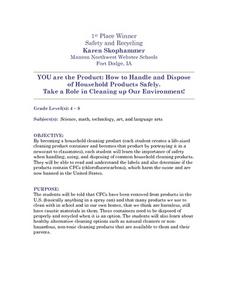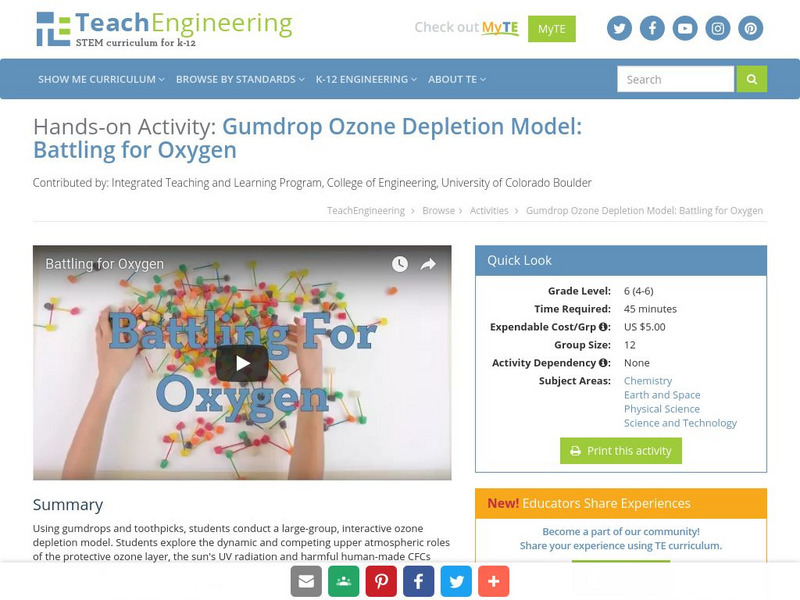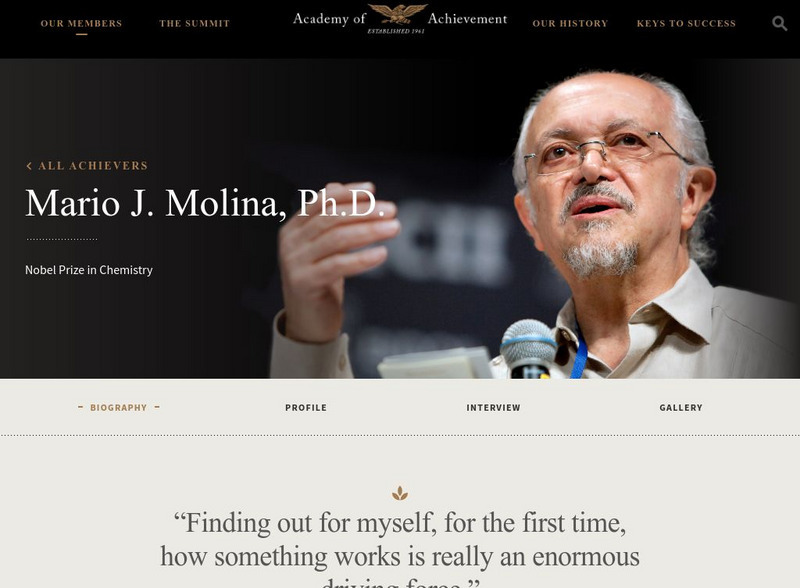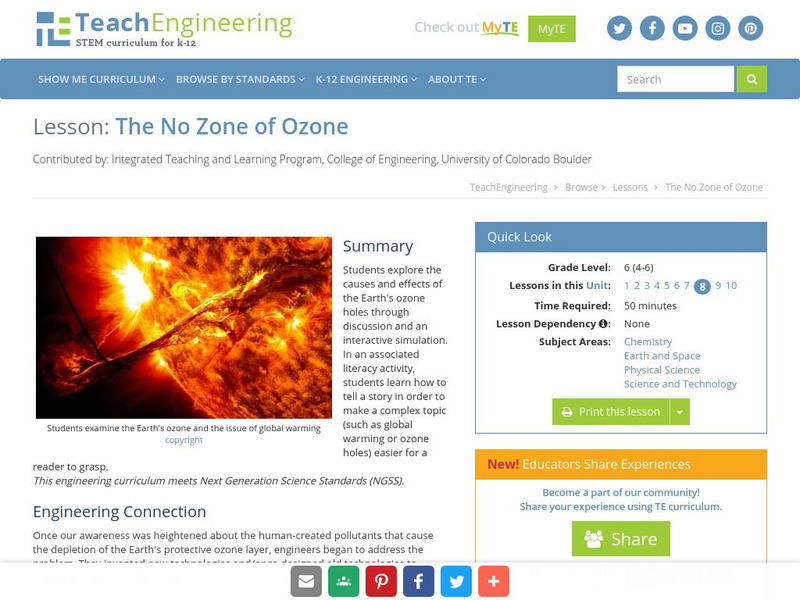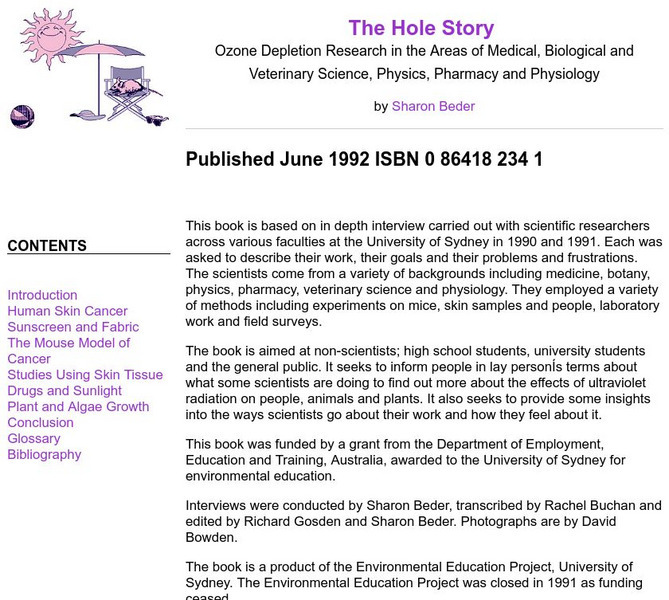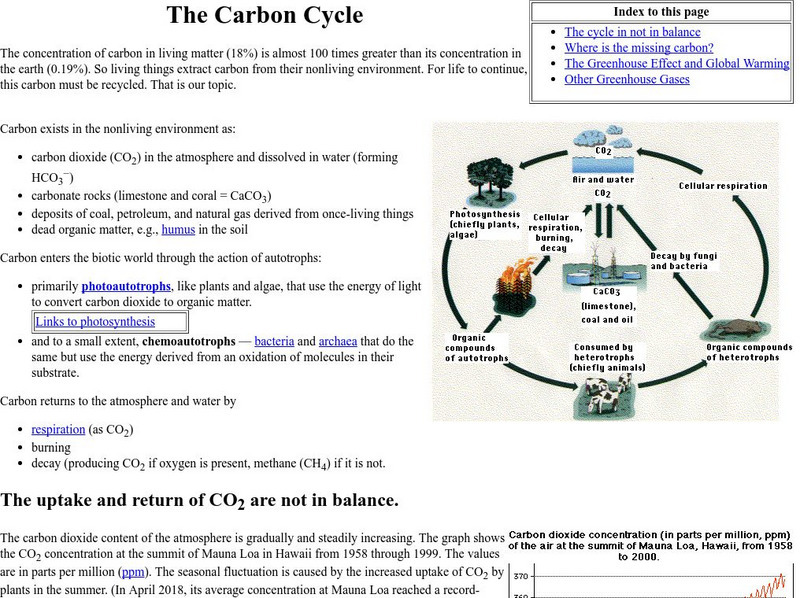American Chemical Society
Chlorofluorocarbons and Ozone Depletion
The best of intentions can have negative results. Learners explore the history of the use of chlorofluorocarbons and their effects on the ozone layer. They discover how widely the compound was used because of its unique chemical...
Chicago Botanic Garden
Greenhouse Gas Emissions – Natural and Human Causes
Part three in the series of seven has pupils discussing the different greenhouses gases, learning about the carbon cycle, and then watching a short video about the carbon cycle. Based on their knowledge, individuals complete a greenhouse...
Curated OER
Atmospheric Chemistry
If you need a comprehensive review of the development of Earth's atmosphere through the ages, then this is for you! The presentation starts with a introduction to theories of planet formation and initial distribution of isotopes in the...
Curated OER
Simple Organic Compounds
In this organic compounds worksheet, students read about the development of chlorofluorocarbons and the breakdown of this compound in the atmosphere. Students complete 2 short answer questions.
Curated OER
How to Handle and Dispose of Household Products Safely
Students engage in the study of household cleaning products, how to read the labels and how to use them safely and also how to properly dispose of the containers when they are empty. They read the labels and determine if the products...
Curated OER
Using Mass Balance to Understand Atmospheric CFCs
Students use an interactive online mass balance model to observe levels of chlorofluorocarbons over the past few years. Students evaluate the influence protocol emissions will have on the future levels of CFCs.
Curated OER
The No Zone of Ozone
Students explore the causes and effects of the Earth's ozone holes through discussion and an interactive simulation. Using gumdrops and toothpicks, they conduct a large-group, interactive ozone depletion model.
PBS
Pbs Learning Media: A Hole in the Sky
This video segment adapted from Interactive NOVA profiles two scientists who were surprised in 1984 to discover a hole in our atmosphere's ozone layer as big as the United States. [3:47]
Other
Cambridge University: Atmospheric Chemistry Research Group: The Ozone Hole Tour
This resource gives information about the ozone hole over Antarctica. There are movies, virtual reality models, explanations and photographs. QuickTime plug-in optional.
Other
Back From the Brink: Lessons Learned From Saving the Ozone Layer [Pdf]
Good site for material on the people involved in inventing CFCs and those who discovered its effects on the ozone layer.
TeachEngineering
Teach Engineering: Battling for Oxygen
Using gumdrops and toothpicks, students conduct a large-group, interactive ozone depletion model. Students explore the dynamic and competing upper atmospheric roles of the protective ozone layer, the sun's UV radiation and harmful...
American Academy of Achievement
Academy of Achievement: Mario J. Molina, ph.d.
Read about the life of Mario J. Molina, winner of the Nobel Prize in Chemistry for discovering the danger that chlorofluorocarbons presented to the Earth's ozone layer long before anyone else recognized it. Includes a profile, videos,...
Columbia University
Nasa: Sedac: Ozone Depletion and Global Environmental Change
[Free Registration/Login Required] Mainly a thematic unit to give teachers a background in CFCs and ozone depletion, this site has a wealth of information for student research.
Other
Rockefeller University: The Environment Since 1970
High level discussion of environmental change in a twenty year period. Look for CFC's as you scroll down to the heading "Indicators of the environment."
Other
Imperial College: Cf Cs
This site from the Imperial College of Science provides a chemistry based discussion of CFCs with formulas and Molecular structures.
NASA
Nasa: The Ups and Downs of Ozone
Scientists look at the efforts to decrease ozone depletion in this news story from the year 2000. Maps and photos. Links to other ozone data-gathering sites. (June 26, 2000)
Famous Scientists
Famous Scientists: Thomas Midgeley Jr.
Meet a key figure in a team of chemists that developed the tetraethyllead additive to gasoline as well as some of the first chlorofluorocarbons.
TeachEngineering
Teach Engineering: The No Zone of Ozone
Students explore the causes and effects of the Earth's ozone holes through discussion and an interactive simulation. In an associated literacy activity, students learn how to tell a story in order to make a complex topic (such as global...
Other
University of Wollongong: The Hole Story
Professor Beder's 1992 book describes the problems and causes of ozone depletion. Find out how ozone depletion affects the environment.
Biology Pages
Kimball's Biology Pages: The Carbon Cycle
Useful introduction to the carbon cycle with a diagram and a discussion of the effects of carbon dioxide on the greenhouse effect and global warming.
Khan Academy
Khan Academy: Chlorofluorocarbons and the Environment
Read a passage about chlorofluorocarbons and the environment and answer the follow-up questions.
Other
Especial Gas Inc.: Chlorofluorocarbons Cfc's
Especial Gas Inc. provides a good description of what CFCs are and the dates that countries started to ban them. Explains where the name freon came from.
Other
Advanced Thermoelectric: Fundamental Thermoelectrics
Discusses the scientific principles (the Peltier effect) and the reliability and operation of thermoelectric modules. Includes a link to several other pages, one of which contains an animation of their operation.






